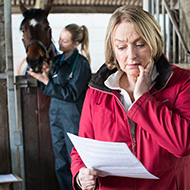
Digestive disorders including ulcers top the list for second year running.
Data collected by horse insurance brokers has identified that gastric ulcers were the most commonly claimed ailment in 2022.
The data, compiled by SEIB Insurance Brokers, revealed that digestive disorders including colic and gastric ulcers were the top cause for claims for the second year running.
Of this group, gastric ulcers were the most commonly claimed digestive disorder with 59 per cent claims relating to this.
A breakdown of gastric ulcer claims revealed that 37 per cent of claims cost over £3,000, with 5 per cent reaching £5,000.
The next most common claim was external trauma from fields and stables, followed by external trauma from riding.
External trauma (from any source) contributed 56 per cent of all equine claims made, with 17 per cent of these claims reaching costs of £3,000.
This was then followed by degenerative diseases, including skin disease, which had an average claim cost of £2,435.
Disease of the teeth, jaws and gums also featured in the top ten ailments list, alongside medical colic and sarcoids, melanoma and tumours.
The cost of living crisis has changed the way horse owners care for their horses, with a World Horse Welfare survey revealing that 20 per cent of horse owners cutting horse care expenditures, including insurance.
SEIB is urging owners to get adequate horse insurance to shield them from the effects of unexpected costs.
SEIB’s marketing manager Nicolina MacKenzie said: “There are so many wonderful advances in veterinary treatment and technology which help our horses live longer, happier and healthier lives. However, this has resulted in the cost of treatments going up significantly meaning that having correct and effective insurance for our horses is more important than ever before.
“We never know what is around the corner, but insurance helps ensure the wellbeing of our horses and provides peace of mind to horse owners.”



 The RCVS has announced a new version of its 1CPD mobile app, with enhanced features for veterinary surgeons and veterinary nurses to record their continuing professional development.
The RCVS has announced a new version of its 1CPD mobile app, with enhanced features for veterinary surgeons and veterinary nurses to record their continuing professional development.